
Latest News Regarding
Horn of Africa
Egypt follows Ethiopia-Somalia agreement, hopes for stability: President al-Sisi
Egypt follows Ethiopia-Somalia agreement, hopes for stability: President al-Sisi

Ibrahim Khazen
Source: ANADOLU AGENCY, Sunday December 29, 2024
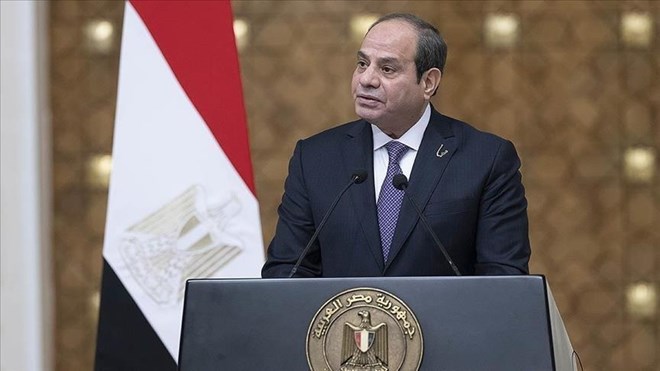
Egyptian President Abdel Fattah al-Sisi said Saturday that he is “closely” following the agreement reached between Ethiopia and Somalia with Turkish mediation and expressing hope it “would contribute to achieving security and stability in the Horn of Africa, according to a statement from the Egyptian presidency.
It came during a telephone call al-Sisi received from his French counterpart, Emmanuel Macron.
Al-Sisi added that he is “closely following the agreement recently reached between Ethiopia and Somalia through Turkish mediation.”
He expressed his “hope that this agreement would contribute to achieving security and stability in the Horn of Africa region, and that it would be in line with the principles of international law.”
The two presidents emphasized “the importance of further enhancing cooperation across various fields, especially economic and investment, while emphasizing the need to attract more French companies to invest in development projects in Egypt,” it said.
The call also involved an exchange of views on regional developments.
The Egyptian president stressed “the close link between security and stability in the Horn of Africa and Egypt’s national security.”
He pointed out that Egypt “is working to support Somalia to achieve security and stability, whether through bilateral cooperation or by participating in the African Union peacekeeping mission at Somalia’s request.”
Ethiopia and Somalia have been at odds since Ethiopia struck a deal in January with Somalia’s breakaway region of Somaliland to use its Red Sea port of Berbera. Türkiye has been working to resolve these tensions.
The Ankara Declaration, brokered by Türkiye and signed Dec. 12, marked a turning point in relations between the Horn of Africa neighbors.
Somalian and Ethiopian leaders emphasized that the declaration “reaffirmed their respect and commitment to one another’s sovereignty, unity, independence, and territorial integrity.”
*Writing by Rania Abu Shamala
Aljazeera Discussion of Almost Hopeless Situation in Sudan
Aljazeera Discussion of Almost Hopeless Situation in Sudan
Source: Aljazeera‘s Inside Story posted on 21 December 2024 a 27-minute video titled “Is the US Willing to Take Action against Foreign Powers Fuelling the Sudan War?‘ with Alex de Waal, World Peace Foundation, Dalia Abdelmoniem, Sudanese political analyst, and Khalood Khair, Confluence Advisory.
The panel concluded that both the Sudan Armed Forces (SAF) and the Rapid Support Forces (RSF), but especially the RSF, are engaging in war crimes. The United Nations and African Union efforts to end the civil war have failed dismally. Russia and the UAE have played especially unhelpful roles. There is little hope for a diplomatic solution, and it is too late for the Biden administration to make a difference.
Increasing Famine and Food Insecurity in Sudan
Increasing Famine and Food Insecurity in Sudan
Source: The Integrated Food Security Phase Classification published on 24 December 2024 a report titled “Sudan: Acute Food Insecurity Snapshot.”
Twenty months into the conflict, Sudan continues to slide into a widening famine crisis characterized by widespread starvation and a significant surge in acute malnutrition. The situation marks a widening of the food and nutrition crisis, driven by the devastating conflict, which has triggered mass displacement, a collapsing economy, the breakdown of essential social services, and severe societal disruption, combined with poor humanitarian access, food insecurity and malnutrition.
Somalia asserts sovereignty as UN approves AUSSOM mission
Somalia asserts sovereignty as UN approves AUSSOM mission

Source: Hiiraan, Saturday December 28, 2024
Mogadishu (HOL) — The United Nations Security Council has approved the African Union Support and Stabilization Mission in Somalia (AUSSOM), marking a shift in Somalia’s security landscape as the country takes greater control over its stability. Resolution 2767 (2024), adopted with 14 votes in favour and one abstention by the United States, replaces the African Union Transition Mission in Somalia (ATMIS). This new mission is set to begin in January 2025, with operations concluding by June 2025.
AUSSOM will deploy up to 12,626 personnel, including 1,040 police officers, under a 12-month mandate to assist Somalia’s security forces in countering Al-Shabaab and other terrorist threats. The Somali government emphasized that its bilateral agreements have secured 11,000 troops for AUSSOM, addressing concerns over potential security gaps.
Somalia’s Deputy UN Envoy, Mohamed Yusuf, welcomed the resolution, calling it a “significant step” and highlighting the hybrid funding model’s role in ensuring predictable and sustainable financial support. The model allocates 75 percent of the budget to UN-assessed contributions, with the remaining 25 percent sourced from the African Union and other partners. However, this model’s implementation depends on a strategic review by the UN Secretary-General in May 2025.
Ethiopia voiced deep concerns at the United Nations Security Council about the escalating threat posed by Al-Shabaab and its alleged growing alliances with global terrorist networks like ISIS. Ethiopia emphasized that the mission’s success hinges on enabling Somalia’s security forces to assume full responsibility, alongside achieving national consensus and a unified regional front against terrorism. Stressing its long-standing contributions to Somalia’s stabilization, Ethiopia reaffirmed its commitment to counterterrorism efforts and called for sustained international and regional collaboration. However, it cautioned against interference by external actors pursuing destabilizing agendas, urging a focus on collective peace and prosperity in the Horn of Africa.
Somalia, in response, pointed to its comprehensive review of security arrangements after 11 months of “documented actions” from Ethiopia, a reference to several incidents and disputes that have strained relations between the two countries. These actions include allegations of arms smuggling into Somalia, which Somali officials claimed were fueling clan conflicts and undermining the country’s sovereignty. Multiple reports indicated Ethiopia’s involvement in illicit arms shipments to Puntland and other regions, prompting Somalia to raise formal concerns at international forums.
The tension between the two countries also stems from Ethiopia’s dealings with Somaliland. Since August, Somalia asserted that Ethiopian troops could not participate in AUSSOM unless Ethiopia nullified its Memorandum of Understanding with Somaliland, a move Somalia viewed as undermining its territorial integrity.
In December 2024, under Turkey’s mediation, Somalia and Ethiopia signed the Ankara Declaration, reaffirming their commitment to each other’s sovereignty and territorial integrity. The declaration implicitly addressed the Somaliland issue without directly mentioning it.
More recently, regional security incidents have heightened distrust. Ethiopian forces reportedly clashed with Somali troops in Dolow this week, raising questions about Ethiopia’s respect for Somalia’s sovereignty.
Somalia firmly outlined its position, emphasizing its sovereignty in determining the structure of AUSSOM. “In that period, our regional partners from three contributing countries have shown remarkable solidarity, pledging to maintain our necessary force of 11,000 troops for AUSSOM,” Somalia’s representative stated. The Somali delegation framed this as a decisive measure to address potential security gaps, adding, “This commitment addresses any security vacuum created by Ethiopia while sustaining progress in the fight against Al-Shabaab.”
The representative reiterated Somalia’s commitment to pursuing future security partnerships aligned with its national and regional interests.
The path to excluding Ethiopia’s exclusion from AUSSOM has sparked raised eyebrows. Somalia’s decision to rely on bilateral agreements for troop contributions, potentially sidelining Ethiopia, reflects a broader recalibration of its regional relationships. Analysts have framed this as a significant assertion of Somalia’s sovereignty and a step toward reshaping power dynamics in the Horn of Africa.
Abdirashid Hashi commented, “Somalia made it clear: ‘Thanks, no tanks.’ Ethiopia is finally out of Somalia.” Another analyst, Abdiwahab Sheikh Abdisamad, described the move as “a decisive shift in Somalia’s approach to regional dynamics and security.”
The resolution has drawn widespread international support, with the United Kingdom, France, and China among the key backers. The UK’s representative praised ATMIS’s contributions and called AUSSOM a crucial step forward in stabilizing Somalia. France highlighted its financial support, noting that the European Union has contributed over 2.6 billion euros to African Union peacekeeping missions since 2007.
The United States abstained from the vote, citing concerns over deviations from Resolution 2719 (2023), which caps UN-assessed contributions at 75 percent of the mission’s budget. U.S. Ambassador Dorothy Shea argued that exceeding this cap could undermine the framework’s credibility and set a risky precedent for future peacekeeping operations.
Switzerland and Slovenia prioritized civilian protection and adherence to international humanitarian law under AUSSOM.
China and the Republic of Korea stressed the importance of avoiding a security vacuum, warning that any delays in AUSSOM’s implementation could embolden terrorist groups. Switzerland and Slovenia emphasized civilian protection and adherence to international humanitarian law under AUSSOM.
The transition from ATMIS to AUSSOM presents both opportunities and challenges. Somalia’s government has urged donors to address funding gaps to ensure the mission’s effective implementation. The hybrid funding model’s success depends on sustained international support and the timely operationalization of mechanisms outlined in Resolution 2719.
Somalia’s firm stance at the UN underscores its commitment to self-reliance and a future defined by Somali-led security solutions. This marks a pivotal moment in the country’s efforts to rebuild its institutions and assert its sovereignty.
Eritrean, Somali leaders discuss stability amid regional tensions
Eritrean, Somali leaders discuss stability amid regional tensions

Source: VOA, By Mohamed Olad Hassan
Thursday December 26, 2024
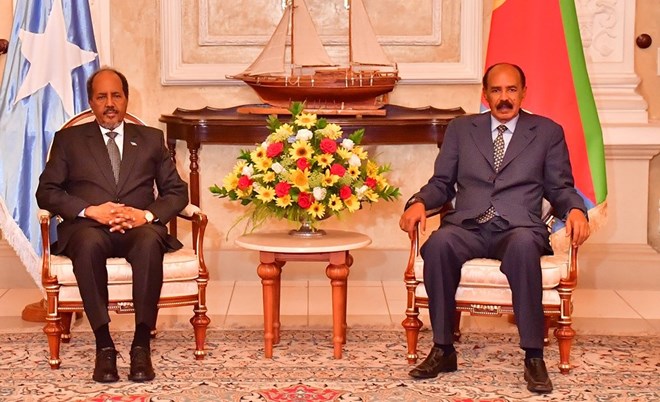
WASHINGTON — President Isaias Afwerki of Eritrea and President Hassan Sheikh Mohamud of Somalia held extensive discussions at the State House in Asmara, Eritrea, on Wednesday, focusing on the consolidation of bilateral ties and addressing regional and international issues of mutual concern.
A statement from the Eritrean Foreign Ministry said the two leaders underlined the importance of Somalia’s stability for the entire Horn of Africa region.
“Securing and [guaranteeing] Somalia’s stability is pivotal for enduring regional peace and stability. In this respect, the two leaders discussed, in greater depth, salient agendas that promote achievement of the desired objective,” the statement said.
Leaders meet for summit
In October, the leaders of Egypt, Eritrea and Somalia met for a three-way summit in Asmara against a backdrop of heightened tensions in the Horn of Africa region between Somalia and Ethiopia.
The October meeting, in which the leaders aligned to sign an agreement covering defense, security, and diplomatic and political cooperation, followed concerns about security and stability that resulted from a controversial deal Ethiopia signed in January with the breakaway Somali region of Somaliland. That deal, if enacted, would give Ethiopia long-sought access to the Red Sea.
Somali diplomats, who requested anonymity because they were not authorized to speak on the matter, told VOA that the two leaders also discussed on Dec. 11 an Ethiopia-Somalia agreement in Ankara that aimed at ending diplomatic tensions between the neighboring countries. They said they have an agreement in principle but are working on technicalities.
According to the Eritrean Foreign Ministry, during their talks on Wednesday, Isaias said that it was necessary for the region to overcome external interventions that often exacerbate conflicts, stressing that local challenges must be addressed internally.
“President Isaias elaborated on the imperative for the region to extricate itself from external interventions that often advance agendas of incubating and fomenting conflict and chaos in the region. In the event, it is critical for the region to address and resolve its own challenges.”
In a subsequent statement to the Eritrean Press, Somali’s president expressed his appreciation for Eritrea’s contributions in the ongoing efforts for training Somalia’s National Army and security institutions.
“The support of Eritrea to Somalia is vital for the stability of Somalia as well as the Horn of Africa region. Somalia can learn from Eritrea’s vast experiences in the efforts to foster viable and robust partnerships,” Mohamud said.
Leaders reaffirm objectives
The two leaders in a statement reaffirmed the objectives laid out in the October Tripartite Summit agreement between Eritrea, Somalia and Egypt, aimed at enhancing cooperation and promoting stability in the region.
The discussions come against the backdrop of Egypt’s commitment to contribute troops to the African Union Somalia peacekeeping mission, highlighting the growing collaboration between Somalia and Egypt amid regional tensions, particularly concerning Ethiopia’s plans to get sea access in Somaliland.
Eritrea has been training thousands of Somalia forces for at least four years. Most of the military has received regular and specialized training, including the naval force, as well as mechanized units.
Mohamud’s visit was the eighth since his reelection in May 2022 and the fourth this year.
Masar oo xaqiijisay inay ciidamado ku biiranayso howlgalka Midowga Afrika ee Soomaaliy

Masar oo xaqiijisay inay ciidamado ku biiranayso howlgalka Midowga Afrika ee Soomaaliy


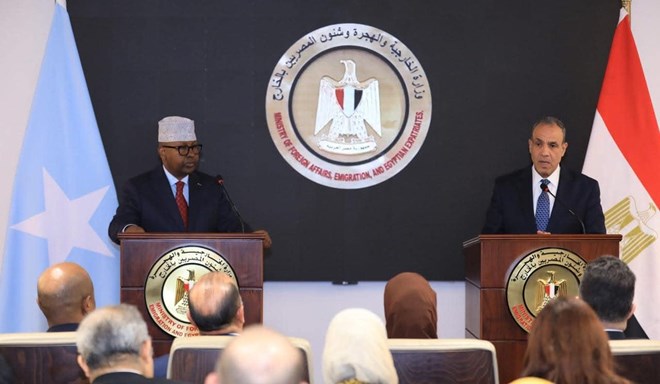
Source: Hiiraan Online, Talaado, December 24, 2024 (HOL) – Masar ayaa ciidamadeeda ku biirin doonta ciidamada nabad ilaalinta Midowga Afrika ee Soomaaliya, wasiirka arrimaha dibadda ee dalkaas ayaa sidaasi ka sheegay magaalada Qaahira.
“Masar waxa ay go’aansatay in ay ka qayb-gasho howlgalkan iyadoo ku saleynaysa codsiga dowladda Soomaaliya iyo soo dhaweynta golaha nabadda iyo ammaanka ee Midowga Afrika,” ayuu yiri Badr Abdelatty oo shir jaraa’id ku qabtay Qaahira.
Hawlgalka xasilinta iyo taageerada Midowga Afrika, ee loo yaqaan AUSSOM, ayaa beddeli doona howlgalka ATMIS ee dhammaanaya sanadkan.
“Waxaan ka hadalnay xaaladda Soomaaliya iyo taageerada Masar ee Soomaaliya ee ku aaddan madax-bannaanideeda iyo diidmada dhaqdhaqaaq kasta oo hal dhinac ah oo taabanaya midnimada, madaxbannaanida iyo amniga Soomaaliya,” ayuu Abdelatty hadalkiisa ku daray.
Warka ay soo saartay dowladda Masar ayaa kusoo beegmaya, iyadoo Soomaaliya ay oggolaatay in ciidamada Itoobiya ay sii joogaan dalka kana sii mid ahaadaan howlgalka nabad ilaalinta sida uu dhawaan sheegay sarkaal dowladda Soomaaliya ka tirsan oo qariyay magaciisa.
Kaddib heshiiskii Ankara, Soomaaliya iyo Itoobiya ayaa bilaabay inay dib usoo celiyaan xiriirkoodii diblumaasiyadeed, inkastoo dowladda Soomaaliya ay shalay ciidamada Itoobiya ku eedeysay in ay ku xadgudbeen heshiiskii Ankara, kaddib markii ay dagaal ku qaadeen ciidamo dowladda Soomaaliya oo ku sugnaa Doolow.
Somalia, Ethiopia forces in deadly clash days after deal
Somalia, Ethiopia forces in deadly clash days after deal

Source: AFP, Tuesday December 24, 2024

Ethiopia’s Prime Minister Abiy Ahmed delivers a speech. AFP
Somalia accused Ethiopian forces of a deadly attack on its troops in a border region on Monday, just days after the two countries signed an accord aimed at resolving months of tension.
The Somali foreign ministry said in a statement that Ethiopian troops had attacked its forces stationed at an airstrip in the border town of Doolow in Somalia’s Jubaland state around 10:00 am.
It said the attack targeted three bases manned by the army, police and National Intelligence and Security Agency, and had caused fatalities, without giving a precise number.
But Jubaland state officials said the Ethiopian troops, who are also based at the airstrip as part of its mission against Islamist insurgents, had intervened to protect a group of local politicians.
Somalia’s federal government has been clashing in recent weeks with forces of the semi-autonomous Jubaland over control of key areas in the state.
“The incident started this morning after the (federal) forces who were stationed here were given instructions to shoot an aircraft carrying a Jubaland state delegation… including state legislators, cabinet members and the governor,” Jubaland security minister Yusuf Hussein Osman said at a press conference in Doolow.
He said a firefight ensued in the town until Somali federal forces were “disarmed and some of them wounded”.
“The pro-Jubaland forces and the Somali government security forces clashed and the Ethiopian forces who are stationed within the airstrip area intervened in support of the pro-Jubaland forces,” a local resident, Mohamed Hassan, told AFP by phone.
“The pro-Somali government forces were later overpowered after the fighting spread in other areas inside town,” he added.
Somalia is a federation of semi-autonomous member states — Puntland, Jubaland, Galmudug, Hirshabelle and South West — that have often clashed with the central government in Mogadishu.
Deal threatened
The incident threatens to upend a deal brokered by Turkey less than two weeks ago to end a nearly year-long dispute between Somalia and Ethiopia.
That dispute began in January when Ethiopia signed an agreement with another breakaway region of Somalia — Somaliland — to lease a stretch of coastline for a port and military base in exchange for recognition, although this was never confirmed by Addis Ababa.
Somalia viewed this as a breach of its sovereignty, sparking a fierce diplomatic and military row.
That appeared to be resolved when Ethiopian Prime Minister Abiy Ahmed and Somali President Hassan Sheikh Mohamud met in Ankara on December 12 and signed a deal that is expected to offer land-locked Ethiopia an alternative sea access in Somalia.
However, Somalia’s foreign ministry said the agreement was undermined by Monday’s incident in Doolow.
“Regrettably, these actions by Ethiopia constitute a blatant violation of the Ankara Declaration,” it said in the statement.
“The Somali Federal Government warns that it will not remain silent in the face of such clear violations of Somalia’s sovereignty and territorial integrity
China and US Pursue Different Approach to Somaliland
China and US Pursue Different Approach to Somaliland
Source: The South China Morning Post published on 19 December 2024 an article titled “China Stands Behind Somalia amid US Push for Somaliland Recognition” by Jevans Nyabiage.
China’s special envoy for the Horn of Africa visited Mogadishu to assure the Somali government of Beijing’s support as reports persist that the incoming Trump administration may recognize the independence of Somaliland.
Ethiopia’s Economic Reform Program Faces Serious Challenges
Ethiopia’s Economic Reform Program Faces Serious Challenges
Source: Foreign Policy posted n 19 December 2024 a commentary titled “Ethiopia’s Precarious Economic Reforms” by Liam Taylor, freelance journalist based in Addis Ababa.
The author argues that Ethiopia’s economic reform package is “fraught with jeopardy.” Political instability and a history of foreign investors who have been burned in Ethiopia does not bode well for the program.
France eyes Djibouti base as key ‘projection point’ in Africa

Seyma Yigit
Source: Anadolu Agency, Sunday December 22, 2024
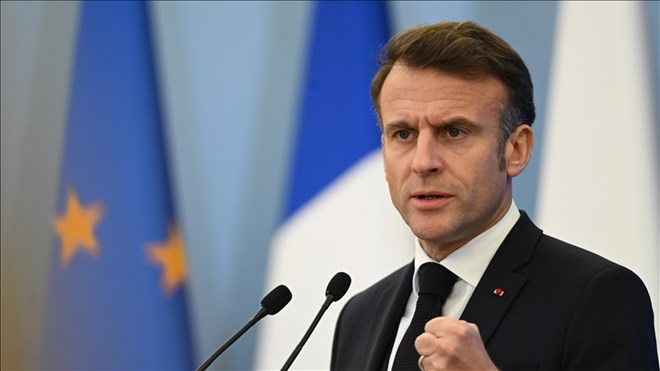
French President Emmanuel Macron said Friday that he wants the military base in Djibouti to once again be defined as a “projection point” for his country’s various missions.
During a visit to the French military base in the East African country, Macron highlighted the changing dynamics in the region.
“Our role in Africa is evolving because the world in Africa is evolving-public opinion is changing, and governments are changing,” he said.
France has begun closing its military bases in several African countries as part of an effort to rebuild relationships with nations across the continent. Macron described the decision as an attempt to establish partnerships based on mutual respect.
“We must change the logic that fuels uncertainty in the countries where our bases are located,” Macron said, referring to growing anti-French sentiment in some of France’s former colonies.
Over the past two years, France has ended defense cooperation agreements with Mali, Niger, and Burkina Faso, withdrawing its troops from these nations.
In September 2023, Burkina Faso, Mali, and Niger formed the Alliance of Sahel States and announced the creation of a joint military force to counter spiraling security challenges posed in their countries by terrorist groups.
Most recently, Chad joined the list, deciding to terminate its military cooperation with France. French troops began leaving Chad on Friday, with the withdrawal of the 1,000 soldiers stationed there expected to conclude by Jan. 31.
France still maintains permanent military bases in Djibouti, Gabon, Ivory Coast, and Senegal. Djibouti, home to 1,500 French troops, is considered France’s most significant military hub in Africa.
Smaller contingents are stationed in Ivory Coast, Gabon, and Senegal, with 600, 350, and 350 personnel, respectively.
Djibouti, located in the Horn of Africa, is strategically significant due to its position at the southern entrance to the Red Sea and its coastline along the Indian Ocean.
*Writing by Seda Sevencan
France supports Ethiopia’s quest for sea access through discussion
France supports Ethiopia’s quest for sea access through discussion

Source: VOA, Sunday December 22, 2024
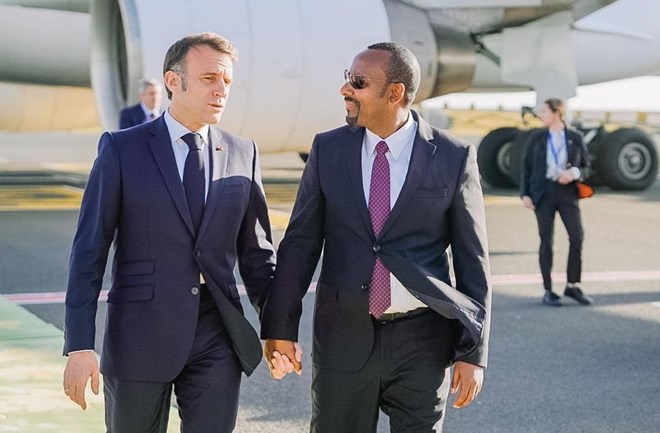
ADDIS ABABA, ETHIOPIA — French President Emmanuel Macron said his country supports Ethiopia’s quest for access to the sea through discussion and respecting international laws and neighboring countries.
Macron spoke on Saturday after a one-day visit to Addis Ababa, where he held bilateral talks with Ethiopian Prime Minister Abiy Ahmed.
During a news conference, Macron welcomed the Ankara Declaration reached by the Federal Democratic Republic of Ethiopia and the Federal Republic of Somalia on Dec. 11.
In the declaration, brokered by Turkish President Recep Tayyip Erdogan, “the leaders of Somalia and Ethiopia reaffirmed their respect and commitment to one another’s sovereignty, unity, independence and territorial integrity, as well as the principles enshrined in international law, the Charter of the United Nations and the Constitutive Act of the African Union.”
The two sides also agreed to start “technical negotiations” by February on details of Ethiopia’s sea access, and that those negotiations would be facilitated by Turkey and be “concluded and signed” within four months.
The breakthrough came after an almost yearlong dispute between Somalia and Ethiopia that began Jan. 1 when Somaliland’s former president, Muse Bihi Abdi, and Ethiopia’s Abiy signed a memorandum of understanding to lease 20 kilometers of Somaliland seafront to Ethiopia for 50 years, in return for diplomatic recognition.
The Somali government rejected the deal and accused Ethiopia of a “blatant violation” of its sovereignty and territorial integrity.
On Saturday, President Macron expressed his readiness to support Ethiopia’s legitimate quest for sea access.
He said France is interested in playing its part in facilitating ways in which sea access can be achieved responsibly through talks, in a way that recognizes international laws and respects neighboring countries.
Abiy said the two leaders have thoroughly discussed his country’s pursuit of peaceful access to the Red Sea. He said the French president accepted Ethiopia’s request for support in its quest for sea access through international law, peacefully and diplomatically.
“The ties between our two nations continue to be strengthened and I look forward to our discussions during his stay in Ethiopia,” Abiy said of Macron in a post on X.
Macron also touched on a domestic issue in Ethiopia: the implementation of the Pretoria agreement signed in November 2022 by Ethiopia’s federal government and the Tigray People’s Liberation Front that ended a deadly two-year war.
Macron said France is keen to support those affected by the conflict and would like to see the rule of law upheld through the transitional justice process.
Abiy and Macron also toured Ethiopia’s newly renovated National Palace in Addis Ababa, the former home of emperor Haile Selassie that was restored with the help of 25 million euros provided by the French Development Agency. The Ethiopian government plans to open it to the public as a museum.
French architects and other professionals have also participated in the renovation process, Macron said.
According to Macron, France is also providing funding and technical support for ongoing renovation at the Rock-Hewn Churches at Lalibela in the Amhara region. The site was added to UNESCO’s World Heritage list in 1978.
It’s the second time Macron has visited Ethiopia in six years.
Before traveling to Ethiopia, Macron visited the cyclone-hit Indian Ocean island of Mayotte, where residents demanded more support in light of the cyclone that devastated the island and claimed dozens of lives.
Macron also stopped by Djibouti, which hosts the largest French military base in the continent, where he dined with his troops.
After meeting with President Ismail Omar Guelleh, Macron described relations with Djibouti as a solid, deep-rooted and forward-looking partnership.
Russia forgives Somalia’s Soviet-era debt
Russia forgives Somalia’s Soviet-era debt

Source: TASS, Saturday December 21, 2024
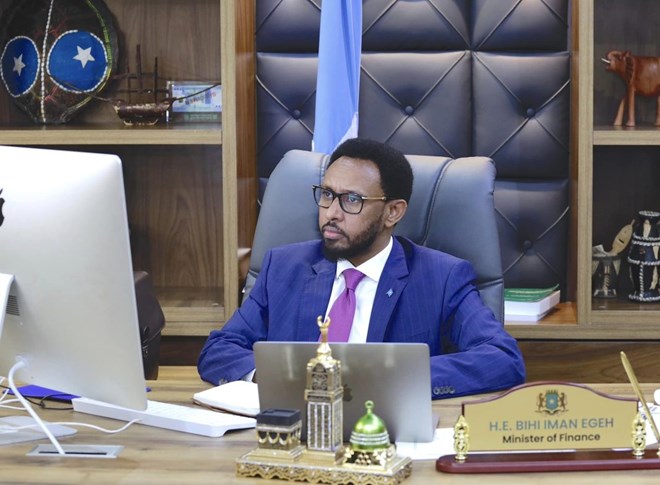
The governments of Russia and Somalia have agreed to settle the African nation’s debt to Moscow.
The document dated December 10 was posted on the web portal of regulatory acts. According to the text of the agreement, the amount with interest accrued under long-term loans extended before October 1, 1984 by the Soviet government to Somalia is written off. The schedule to the agreement indicates that the total debt amount was $48.1 mln.
“One hundred percent of the stated amount is consolidated in accordance with this agreement,” the document reads. “The government of the Federal Republic of Somalia is released from paying the full consolidated amount,” the agreement stipulates.
The document is a follow-up to the Russian-Somalian agreement dated July 26, 2023 that set forth the debt repayment schedule. With Somalia now exempt from paying back Soviet-era loans, the schedule has been adjusted, and the remaining debt will be fully settled by April 2028.
Uganda, Kenya, South Sudan agree on plans to mark shared borders
Uganda, Kenya, South Sudan agree on plans to mark shared borders
Source: The Kampala Post
by Nicholas Agaba
Saturday December 21, 2024
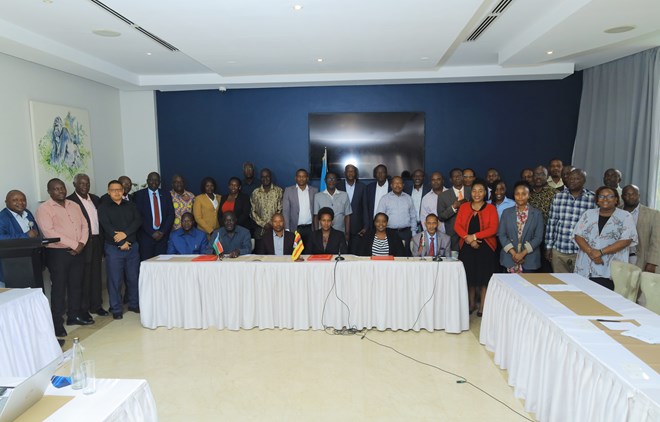
The 4th Tripartite Technical Boundary Committee (TTBC) meeting, involving Uganda, Kenya, and South Sudan, was held from December 17 – 19 at the Golden Tulip Hotel, Kampala. The meeting aimed to track progress on decisions made in earlier sessions in December 2019, September 2021, and December 2021. Key objectives included revising work plans and budgets for establishing the tri-junction and agreeing on a start date for reaffirming the boundary point.
Jacqueline W. Banana, Acting Head of the Department of Regional Peace and Security, led Uganda’s delegation. Kenya’s delegation was led by Juster Nkoroi, Head of the Kenya International Boundaries Office (KIBO), while South Sudan’s delegation was headed by Dr. David Nailo Mayo, Chairperson of South Sudan’s Transboundary Committee.
The meeting was officially opened by Uganda’s Permanent Secretary of the Ministry of Foreign Affairs, Bagiire Vincent Waiswa, who emphasised the importance of reaffirming and demarcating the tri-junction boundary. He highlighted the significance of resolving boundary disputes to promote regional stability, cooperation, and development. “The three nations are bound together not only by geography but by shared heritage, language, customs, and norms, including mutual interests in trade, security, and development,” Bagiire said.
Bagiire also acknowledged the support of the African Union Border Programme (AUBP), the German Corporation for International Cooperation (GIZ), and the East African Community (EAC). These partners have provided funds, equipment, and technical expertise while conducting sensitisation efforts to involve border communities in the demarcation process.
Banana, leading Uganda’s delegation, welcomed all participants and expressed gratitude to the African Union for funding the previous tripartite meetings. She reiterated that the sessions had laid the groundwork by agreeing on modalities, budgets, and work plans for establishing the tri-junction.
Juster Nkoroi, Kenya’s Head of Delegation, noted that significant milestones had been achieved, including seven sensitisation exercises and high-level meetings, such as the Ateker leaders’ forum in Moroto in November 2024 and a peace caravan in July 2023. She reaffirmed Kenya’s readiness to implement agreements on boundary reaffirmation, delimitation, and demarcation in line with the African Union’s 2027 deadline.
Dr. David Nailo Mayo, head of South Sudan’s delegation, acknowledged the longstanding support of the African Union Border Programme since its inception in 2007. He lauded the AU’s efforts in facilitating meetings and aiding in border-related initiatives.
The meeting concluded with the signing of the report on the Kenya-South Sudan-Uganda Tripartite Technical Boundary Committee’s progress, marking another step towards establishing the tri-junction boundary poin
Somaliland proposes hosting US military base in exchange for independence recognition
Somaliland proposes hosting US military base in exchange for independence recognition
Source: Caliber.Az
Saturday December 21, 2024
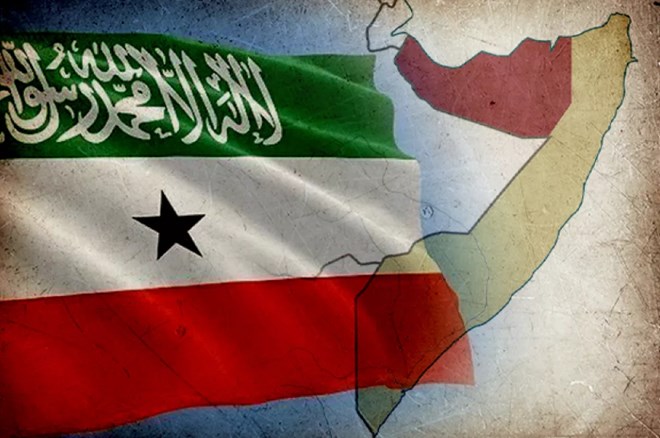
The self-declared Republic of Somaliland has announced its readiness to host a US military base in the strategic port city of Berbera, provided such an arrangement aligns with the mutual interests of both nations.
“Somaliland would be ready to host a US military base in Berbera if it serves the mutual interests of our two nations,” Bashir Goth, Somaliland’s representative to the United States said, Caliber.Az reports via Russian media.
He emphasized that this potential cooperation is not contingent on US recognition of Somaliland’s sovereignty, though he expressed hope that such recognition might come under President Donald Trump’s administration.
“We consider ourselves an independent and sovereign state. Therefore, we evaluate any partnerships with friendly nations exclusively through the prism of our national interests,” Goth stated, addressing concerns about potential ramifications for Somaliland’s strained relationship with Somalia.
Recent reports from the publication Semafor suggest that a Trump presidency could significantly accelerate US recognition of Somaliland as an independent state. Such a move could enhance US intelligence operations in the volatile region, including monitoring arms transfers, observing Chinese activities from its military base in Djibouti, and tracking Houthi movements in Yemen.
Thomas Wolf, a political analyst with Kenya-based research centre TIFA, indicated that recognizing Somaliland’s sovereignty would provide the US with strategic advantages. “Trump, after assuming office, may declare recognition of Somaliland to leverage Berbera’s port on the Red Sea, including for military purposes,” he noted.
Somaliland, located in the northwest of Somalia along the Red Sea, declared independence unilaterally in 1991 but has not received international recognition. It operates its own currency, military, and issues passports.
In January 2024, Somaliland signed an agreement with Ethiopia granting lease rights to the Berbera port in exchange for Ethiopia’s recognition of Somaliland’s independence. This deal intensified tensions between Ethiopia and Somalia’s federal government, which refuses to acknowledge Somaliland’s sovereign status.
On December 12, Turkish President Recep Tayyip Erdoğan announced a breakthrough in negotiations between Somali President Hassan Sheikh Mohamud and Ethiopian Prime Minister Abiy Ahmed. Talks held in Ankara resulted in a joint declaration, committing the two nations to resolve their disputes through Turkish-mediated technical discussions by February 2025. A bilateral agreement is anticipated within four months of these discussions.
Somalia hires lobbyists, prepares for more combative Trump era
Somalia hires lobbyists, prepares for more combative Trump era

Source: theafricareport, By Julian Pecquet, in Washington
Saturday December 21, 2024
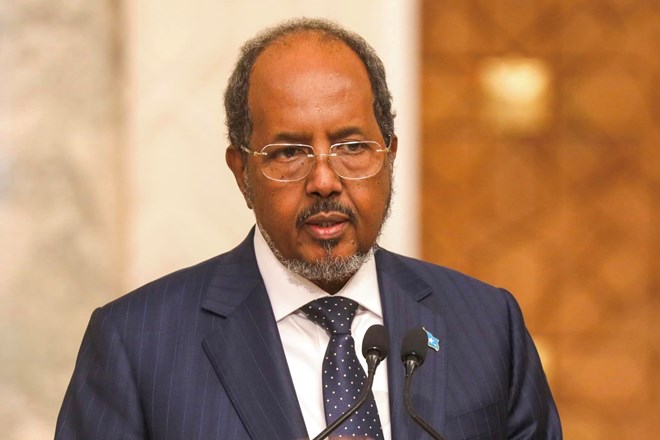
Trump’s entourage is pushing for the US to recognise Somaliland, with Senate committee leadership also favouring the breakaway province.
The Somali embassy has hired one of Washington’s top lobbying firms as it braces for a potentially rocky road ahead under President-elect Donald Trump.Barely two months into his tenure, Ambassador Dahir Abdi hired the BGR Group on 27 November for $50,000 per month for 12 months, or $600,000 total. The contract filed with the US Department of Justice states that BGR will provide “government affairs services” for the embassy.
Top of mind for the Somali government is the growing push for the US to recognise the breakaway region of Somaliland as an independent country, particularly among Republicans. Since last year, Somalia has also pursued eligibility for the African Growth and Opportunity Act (AGOA).
Relations with the US suffered a blow in Trump’s first term.
The then-president included Somalia in his “Muslim ban” on travel from certain countries and later pulled most US forces battling Islamist insurgents out of the country at the tail end of his first term. President Joe Biden reversed the decision in 2021.
“Somalia and the US are natural partners,” the Somali Embassy tells The Africa Report. “We continue [to] work together on counterterrorism and other important security programmes. We also look forward to expanding that work and the economic relationship to our mutual benefit.”
Somaliland fight
This time around, a growing chorus of Republicans in Trump’s orbit is making the case that he should recognise Somaliland’s independence as a hedge against China in the Horn of Africa.
Countering China policies “should include … recognition of Somaliland statehood as a hedge against the US’ deteriorating position in Djibouti,” former Trump State Department director of Policy Planning Kiron Skinner writes in the diplomacy section of Project 2025, a conservative blueprint for a Republican administration led by the Heritage Foundation.
Several Republican veterans of the first Trump administration – including former Assistant Secretary of State for African Affairs Tibor Nagy and former special envoy for the Great Lakes Peter Pham – are also publicly making that case.
Last week, Republican Congressman Scott Perry of Pennsylvania, a member of the House Foreign Affairs Committee, introduced a bill “to recognise Somaliland of the Federal Republic of Somalia as a separate, independent country”. Perry introduced similar legislation two years ago but it went nowhere.
“We want to keep the conversation open and current,” Perry tells The Africa Report about his decision to introduce the bill in the waning days of the current Congress.
Republican Congressman Brian Mast of Florida, the incoming chairman of the House Foreign Affairs Committee in the next Congress, tells The Africa Report that he has yet to speak to Perry about his bill.
“I’m certainly willing to … sit with him, look at it, see what he’s done on it, and speak to the African subcommittee as well,” Mast says.
Senate Somaliland boosters
Meanwhile, in the Senate, Somaliland advocate Jim Risch of Idaho is set to take control of the Senate Foreign Relations Committee next year following the Republican victory in the November election. Risch introduced a Somaliland Partnership Act in 2022 that stops short of recognition but promotes opportunities for collaboration on regional security issues.
Lobbyists registered on the contract include Lester Munson, a former Republican chief of staff on the Senate Foreign Relations Committee, and Scott Eisner, former president of the US Chamber of Commerce’s US-Africa Business Centre.
BGR previously lobbied for the Somali Ministry of Finance in 2018-2019.
EU extends Operation ATALANTA, EUTM and EUCAP Somalia for two more years
EU extends Operation ATALANTA, EUTM and EUCAP Somalia for two more years
Safety 4 Sea
Source: Safety 4 Sea, Tuesday December 17, 2024
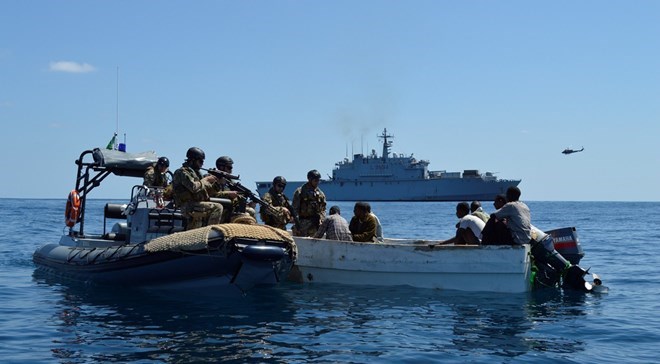
The European Council on 16 December decided to prolong the mandate of the EU Naval Force Operation ATALANTA and of the EU’s military training mission in Somalia (EUTM Somalia) until 28 February 2027.
This comes after the Council’s decision of 5 December to prolong the mandate of the EU’s civilian capacity-building mission (EUCAP Somalia) until the same date. These decisions were taken following the holistic strategic review of the Common Security and Defence Policy (CSDP) engagement in Somalia and the Horn of Africa, with the aim to strengthen the EU’s response to an evolving security context and to enhance its role as a maritime security provider.
At the same time, the Council updated the mandate of Operation ATALANTA to enhance maritime security off the coast of Somalia, in the Gulf of Aden, the West Indian Ocean and parts of the Red Sea, and better support building a wider regional maritime security architecture. With the new mandate, the Operation will continue to fight piracy and reduce illicit trafficking at sea.
Synergies with the maritime Operation ASPIDES, currently protecting merchant shipping in the Red Sea, will be enhanced. In parallel, the Maritime Security Center (MSC) Horn of Africa, supporting both ATALANTA and ASPIDES, is being rebranded as MSC Indian Ocean and its role is being reinforced.
Furthermore, in Somalia, the EU’s CSDP action was widened to support the build-up of Somali Security Forces and institutions with the view to take over responsibility for its own security in the future, in line with the Joint EU-Somalia Roadmap. With the renewed mandates, EUCAP Somalia and EUTM Somalia will support the build-up of capable, sustainable, and accountable Somali security institutions through strategic advice, mentoring and training, accompanied by EU-funded equipment support through the European Peace Facility.
To strengthen the regional approach, the missions and the operation will support capacity-building efforts of the regional and, in particular, Djibouti maritime security forces within their means and capabilities.
According to the Council’s statement, in order to uphold the EU’s core values, all activities will pay particular attention to international humanitarian law, human rights, preventing gender-based violence, protecting children in armed conflicts, and promoting the agenda of women, peace and security and climate, security and defence.
US Special Envoy for Sudan Warns Country Headed for Partition
US Special Envoy for Sudan Warns Country Headed for Partition
Source: The Irish Times published on 13 December 2024 an article titled “Sudan War Pushing Country towards Partition, US Envoy Says” by David Pilling.
According to US envoy to Sudan, Tom Perriello, Sudan is at risk of breaking apart or becoming a “failed state” as foreign powers stoke a war that continues for decades and exacerbates an already massive humanitarian catastrophe.
Egypt reaffirms support for Somalia’s sovereignty, unity, and stability
Egypt reaffirms support for Somalia’s sovereignty, unity, and stability

Source: ahramonline, Monday December 16, 2024
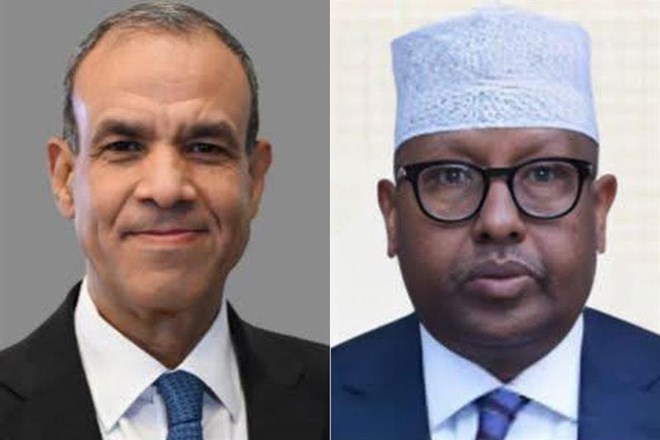
Minister of Foreign Affairs Badr Abdelatty reiterated Egypt’s unwavering support and respect for Somalia’s sovereignty, unity, and territorial integrity during a phone call on Saturday with his Somali counterpart, Ahmed Maalim Fiqi.
According to a statement by the Egyptian foreign ministry, Fiqi briefed Abdelatty on the outcomes of the recent Ankara Trilateral Summit, held between Somalia, Turkey, and Ethiopia on Wednesday.
The statement added that Abdelatty and Fiqi agreed to maintain ongoing coordination and to prepare for the upcoming trilateral ministerial meeting between the foreign ministers of Egypt, Somalia, and Eritrea, a meeting which, according to the statement, reflects the importance the three countries’ leaders attach to holding extensive consultations on issues of mutual concern.
Furthermore, the call between the two diplomats addressed the strategic relations between Egypt and Somalia and the two countries’ desire to strengthen and develop their political, economic, and commercial ties.
According to the statement, Abdelatty and Fiqi also acknowledged that relations between Egypt and Somalia have gained considerable momentum in recent months. They stressed the importance of exploiting that momentum to strengthen ties between the two countries.
In conclusion, the statement highlighted that the two sides confirmed the importance of following up on the outcomes of the trilateral summit that brought together the presidents of Egypt, Somalia, and Eritrea in Asmara in October.
China sends new navy fleet on Gulf of Aden escort mission
China sends new navy fleet on Gulf of Aden escort mission

Source: Xinhua, Monday December 16, 2024
.jpg)
A farewell ceremony is held for a Chinese navy fleet at a port in Zhoushan, East China’s Zhejiang province, Dec 15, 2024. A new fleet of the Chinese People’s Liberation Army Navy set sail from a military port in Zhoushan, East China’s Zhejiang province on Sunday to take over an escort mission from the previous fleet in the Gulf of Aden and the waters off Somalia. (PHOTO / XINHUA)
HANGZHOU – A new fleet of the Chinese People’s Liberation Army Navy set sail from a military port in Zhoushan, East China’s Zhejiang province on Sunday to take over an escort mission from the previous fleet in the Gulf of Aden and the waters off Somalia.
The 47th navy fleet comprises a guided-missile destroyer, a missile frigate and a supply vessel. It carries over 700 officers and soldiers, with two helicopters and more than 10 special force members on board.
Prior to the departure, the fleet conducted trainings focused primarily on the armed rescue of hijacked merchant ships, counter-terrorism and anti-piracy, as well as on the practical use of weapons.
U.S. congressman introduces bill to recognize Somaliland as an independent state
U.S. congressman introduces bill to recognize Somaliland as an independent state

Source: Hiiraan Online, Monday December 16, 2024
Rep. Scott Perry addresses reporters during a news conference at the U.S. Capitol, highlighting ongoing debt limit negotiations in Washington, D.C., on March 10. (Photo: Anna Moneymaker/Getty Images)
Mogadishu (HOL) — A Republican-sponsored resolution seeking U.S. recognition of Somaliland as an independent state has been introduced in the House Foreign Affairs Committee. The proposal, H.R. 10402, submitted by Congressman Scott Perry of Pennsylvania on December 12, has sparked debate but faces steep odds of advancing in Congress.
The resolution advocates for a shift in U.S. policy to acknowledge Somaliland’s self-declared independence. Perry and his Republican allies frame Somaliland as a strategic partner in a region where China and Russia continue to expand their influence. Despite Somaliland’s record of stability since 1991, the resolution’s prospects remain uncertain due to long-standing U.S. support for a unified Somalia.
The Heritage Foundation’s Project 2025, a conservative policy roadmap embraced by Trump-aligned Republicans, explicitly mentions Somaliland. The document proposes U.S. recognition of Somaliland as a strategic move to counter China’s influence in the Horn of Africa. Republican policymakers view Somaliland’s stability and governance as aligning with U.S. strategic interests in Africa.
Trump’s past criticisms of Somalia—he once referred to it as a “failed state”—have further emboldened efforts to elevate Somaliland’s case. Supporters argue that recognizing Somaliland could provide Washington with a reliable partner in an increasingly contested region.
“For over three decades, Somaliland has proven itself as a peaceful, functioning democracy,” said a senior Republican foreign policy advisor. “This resolution is a step toward rewarding that success.”
The Somali government has vehemently opposed the resolution, describing it as a threat to Somalia’s sovereignty and regional stability.
Somalia’s leaders have consistently warned that any move to recognize Somaliland could embolden separatist movements across Africa and jeopardize Somalia’s fragile progress.
Somaliland, located in northern Somalia, declared independence in 1991 after the collapse of Somalia’s central government. For over three decades, it has operated as a de facto state, with democratic elections, relative peace, and functional institutions setting it apart from the rest of Somalia. Despite these achievements, no country formally recognizes Somaliland’s sovereignty.
Somaliland officials view Perry’s resolution as a long-overdue acknowledgment of their successes and a potential turning point for their international standing.
The resolution comes as geopolitical competition intensifies in the Horn of Africa. China and Russia have deepened their regional involvement through infrastructure deals and military partnerships, heightening concerns in Washington. Somaliland’s supporters argue that recognition would give the United States a strategic advantage and counterbalance rival powers.
However, analysts warn that formal recognition would provoke strong opposition from the African Union (AU), which views such moves as a threat to the territorial integrity of its member states, including Somalia. The AU’s position is deeply rooted in Africa’s colonial history, when European powers drew arbitrary borders at the Berlin Conference of 1884-85, disregarding ethnic, tribal, and clan boundaries. These borders, though artificial, were upheld in the 1964 Cairo Declaration to maintain peace and stability across the continent.
The African Union fears that recognizing Somaliland’s independence could open a Pandora’s box of secessionist claims, encouraging separatist movements in regions like Biafra in Nigeria, Ambazonia in Cameroon, and Casamance in Senegal. Such a precedent risks destabilizing fragile states grappling with ethnic divisions, governance challenges, and territorial disputes.
Diplomatically, analysts suggest that U.S. recognition of Somaliland could strain relations with key African nations and regional bodies like the AU and IGAD (Intergovernmental Authority on Development). African leaders may interpret such a move as a dangerous precedent undermining established norms, creating a rift in U.S.-Africa relations at a time when Washington seeks to counter growing Chinese and Russian influence on the continent.
While H.R. 10402 has brought renewed attention to Somaliland’s aspirations, its path forward remains uncertain. Historically, only about 5% of all bills introduced in Congress become law, and the odds drop to around 1-2% when the proposal involves a major policy shift, such as altering foreign recognition. Perry’s resolution, introduced with less than a month remaining in the current session of Congress, faces significant procedural challenges. The lame-duck session—a period following elections where outgoing lawmakers have diminished influence—further complicates its chances of passage.
In addition to time constraints, foreign policy initiatives of this magnitude often stall due to competing legislative priorities, particularly during the end-of-year period when Congress focuses on critical budget approvals and must-pass bills. Analysts suggest Perry’s resolution is unlikely to progress beyond committee review.
It is not the first time Congressman Perry has advocated for Somaliland’s recognition. In March 2022, he introduced the “Republic of Somaliland Independence Act” (H.R. 7170), which authorized the President to recognize Somaliland as a separate, independent country. Like the current resolution, H.R. 7170 was referred to the House Committee on Foreign Affairs but did not advance further.
